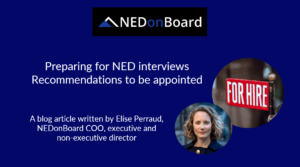It was a pleasure to speak to Maria and find out more about her experience as a non-executive director. Maria is an experienced SME director and Charity Trustee and one of the founding directors of Clevercoms. She is a marketing and business consultant with significant operational experience in consultancy and in-house.
How did you become a non-executive / land your first non-executive role?
By accident. I was advising a housing association as a Marketing Consultant. They had been reliant on local authority funding and there were significant changes going on in the market. They needed to consider other options. It became quickly clear to the CEO that I could add value to the management committee/board because of my commercial experience. Everybody else was from a housing association or social services background. I was up for the challenge and it certainly was one.
What are the big issues facing boards & non-executives?
An issue that is much talked about is the drive to get more women on to boards. This is important and not just for FTSE companies. Research shows that boards need people from varied backgrounds because diverse groups are stronger and think more creatively. A recent research report by Russell Reynolds Associates found that “A board composed of directors representing a range of perspectives leads to an environment of collaborative tension that is the essence of good governance”. A more diverse board makes organisations more competitive and customer focused and enhances their ability to exploit growth opportunities and so generate revenue and profit.
Information security is also an issue that the board needs to take seriously. Developing a robust information security strategy is much more than a technical requirement. It is about governance, process and behaviour and ultimately an organisation’s culture. Non-executive directors and trustees have a key role in helping to identify and mitigate threats and risks to their organisation. Information is, surely, one of its most valuable assets.
Closely linked to information security is the risk to reputation. The increasing use of social media makes reputation management a major issue. Reputational damage can have a significant financial impact on an organisation whether private sector or not-for-profit. The board cannot detach themselves from these issues any longer. They are not merely operational and the board must take a leading role.
What are the desired skill sets for successful non-executives?
The desired skills for a non-executive really depends on the nature of the organisation. An SME or smaller not-for-profit would need a significantly more hands-on approach than would be required for a FTSE company. While larger organisations may require a specific discipline or expertise, a smaller organisation needs a much broader field of knowledge.
There are of course basic skills that you need whatever the situation e.g.
• Integrity
• Sound judgement
• An inquiring and inquisitive mind with the ability to assimilate, assess and analyse information, especially financial information
• The ability to co-operate and work as part of a team
• Creativity and being able to take a wider, strategic view
• Confidence, persuasiveness and the ability to communicate ideas
• Political astuteness and an ability to identify potential problems, conflicts and risks
And above all, good listening skills.
What can you do to prepare for your role as a new non-executive?
Do your due diligence on both the organisation and the board. You would be surprised at how many people don’t even look at the company’s web site. Talk to a non-executive who has recently stepped down. They can be a valuable source of information.
Keep an open mind when considering a non-executive role. Consider what skills you have which are transferable across organisations and sectors. Sometimes coming from a different sector can be an advantage as I found in my first appointment. You can bring fresh ideas and experience.
What are your top 3 pieces of advice for new non-executives?
• A board member sits above an organisation and does not work in it. Your role is to be objective, to challenge and provide support when required.
• Do not be afraid to ask questions no matter how difficult or even trivial you think they might be.
• Governance – take it seriously. Your role might not be full time but as a non-executive director or trustee, you have responsibilities 365 days a year.
Want to know more?
- If you are looking to transition to the board as a non-executive director, we invite you to register your attendance at our next complimentary webinar session: “How to secure your first NED role.”
- If you are committed to start your NED journey, please visit the NED Accelerator Programme by NEDonBoard. We applied years of accumulated knowledge and worked with experienced NEDs and chairs to deliver practical and actionable content to professionals looking to successfully and confidently transition to non-exec roles.




